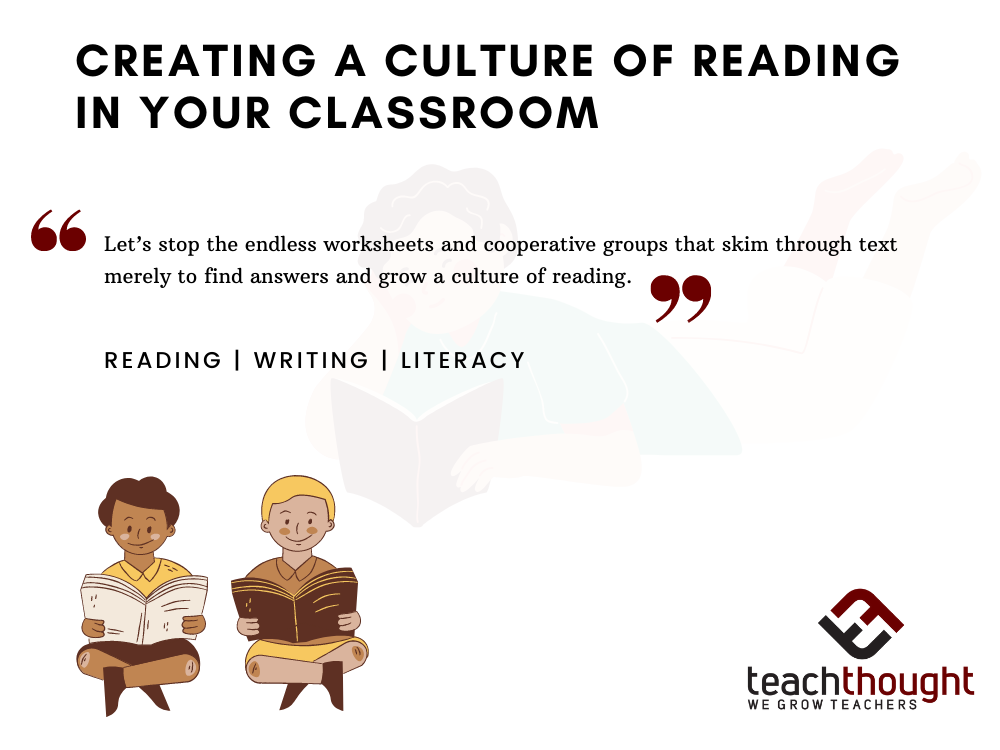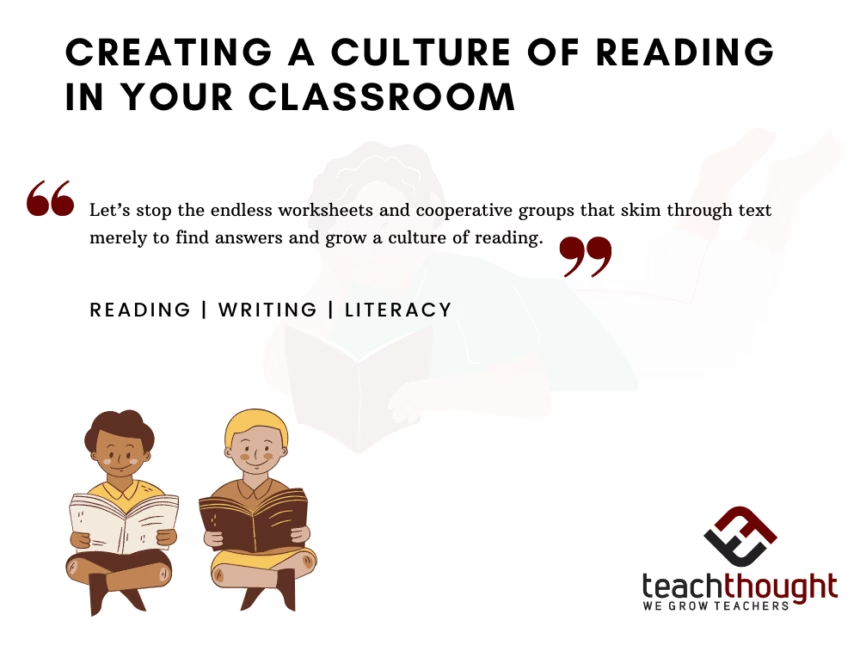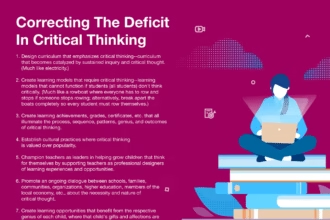

contributed by Angela Peery
Picture a classroom full of youngsters.
They could be darling, chubby-cheeked kindergartners or swaggering, confident high school seniors – or anything in between. Can you see them?
Now, picture this class engrossed in reading.
What does being engrossed in reading look like? What does it sound like? What evidence exists that true, engaged reading is taking place?
See also What Is Critical Reading?
In my visualization, I see a room full of freshmen – my classroom of yesteryear. Five or six students are lounging in the reading area, reclining on the sofa or stretched out on floor pillows. A dozen or so students are at their desks with their noses buried in books, their desktops strewn with pencils, highlighters, and sticky notes. A group of four girls sits cross-legged near the doorway, each with their own copy of a provocative young adult novel, whispering about what has happened and what might happen next.
See also What I Tell Students When They Say They Don’t Like To Read
They’ve chosen to read the book together and push each other to meet their self-imposed schedule for discussion. Along the sides of the room, near a couple of electrical outlets, are students sitting alone, with headphones, listening to audiobooks. One is lying on his back, staring up at the ceiling. The other is lying on his side, following along in a hard copy of the book, often stopping, rewinding, and carefully replaying the audio, following the text with his index finger.
And there I am – I can see myself near the front of the room, sitting in one chair with my feet propped up in another, devouring some current nonfiction, glaring at any student who dares interrupt my concentration or the concentration of a classmate. When is the last time you saw a classroom as I’ve described, not just in your head, but in reality?
In my consulting work in the past five years, I have seen classrooms that are truly engaged in reading only a handful of times. I remember them vividly because they are exceedingly rare.
One was a room full of first-graders, spread out at various stations, rotating every 15 or 20 minutes. One group was at a table with a paraprofessional, another was on the floor with books, and yet another on the floor with tablet devices. Lastly, one group was at a table doing some kind of hands-on activity related to their reading. I listened as the adults talked with the children about their reading. These kids could talk about the characters, the events, the whole shebang. They weren’t just regurgitating. They were invested.
Another was a middle school classroom. The teacher started class with everyone sitting in a circle on the floor. She posed an authentic, no-one-right-answer question about the book they were all reading together. The students eagerly responded to her question and to each other. They posed new questions. The discussion was energizing. After about ten minutes, the students raced to their desks, ready to open their books and continue reading, inspired.
Much more common in my observations is the room where reading is inflicted upon the students. They sit at their desks, compliant for the most part, waiting for the next worksheet or the next recall-level question. Those who enjoy playing the game of school answer aloud and answer quickly. They sometimes prod their neighbors to participate in the discussion or complete the questions on the worksheet. Those who don’t enjoy the game put their heads down or engage with whoever is on the other end of their cell phones.
Those who despise the game act out. They might be up, wandering around the classroom, or they might be calling out inappropriate comments. They might be repeatedly asking to go to the restroom, or the nurse, or the guidance counselor. When the drudgery is too much for them to bear, they will do something horrendous enough to warrant the teacher removing them from the room.
What has become of reading in school? The terms ‘close reading’ and ‘complex text’ have been used enough the past few years to make me visibly cringe when a teacher utters them. Did we ever want students not to read closely? Of course not. Did we ever want the end goal of a lesson or unit to be that students could read simplistic text? No. But have these terms – or possibly our application of them – killed engaged reading in our classes?
What should an engaged reading culture look like, sound like, and achieve for readers?
My first thought is to return to Nancie Atwell and her mantra for the reading/writing workshop: we must give students time, ownership, and response. Are we ELA teachers giving students time to read in class? Do we assign reading and then expect it to be done somewhere else? Shouldn’t reading be done when and where we can best help, which is in our classrooms? Does a reader ever become a stronger reader without role models, coaches, and peers to read alongside? I doubt it.
And what is the role of ownership? I have seen self-selected reading virtually disappear in the age of the national standards. Teachers scurry to cover assigned text after assigned text and spend hours adapting activities to take into account the weak reading skills and the downright resistance of their students. To me, this is not the right path. The right path is to make more time for reading materials of choice to boost the skills (like stamina!) that are needed to tackle assigned (and often boring) materials.
Given the right conditions, students will tackle extremely complex texts independently. Sometimes peers will help facilitate this; at other times, a caring teacher will. I vividly remember a student who told me he had never read a whole book during our first week of school. He was fifteen. He worked with his father on a commercial fishing boat. What was the first book I put in his hands? The Old Man and the Sea. And I stayed by his side as he lumbered through it. Guess what he tackled later in the year? The Call of the Wild. This is but one tiny example of what a teacher who truly values reading can do.
This particular student was buoyed by the trifecta of time, ownership, and response. I responded to him as a fellow reader, not as a teacher checking off specific objectives on a record of his reading achievement. When one’s teacher and one’s peers are also engaged readers, it’s hard not to partake in the community.
So let’s stop the endless worksheets. Let’s end the fake cooperative groups that skim through text merely to find answers to the teacher’s tedious questions. Let’s again make room in the curriculum for an engaged culture of reading, where readers actually sit and read in the company of other readers, because it’s important enough to do so together, in class, in a community. Where readers talk with each other about what they’re reading because they want to, not because they’re being forced to. And where readers tackle the classics and other difficult texts with confidence, because they know they can draw upon authentic reading experiences to help them.
As Pernille Ripp has noted, “In our quest to create lifelong readers, we seem to be missing some very basic truths about what makes a reader.” We need to restore time, ownership, and response to their rightful status in instruction before we create an entire generation of non-readers.









